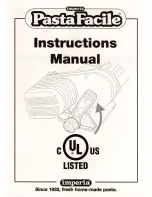
11
5.3 CONNECTION TO THE WATER MAINS
‼ IMPORTANT:
•
The appliance must be connected to the water mains by professionally qualified personnel in accordance
with the Manufacturer’s instructions.
•
This appliance must be only be supplied with cold water for human consumption (drinking water).
•
The operating pressure must be between 0.1 and 0.6 mpa.
•
A tap must be installed between the water mains and the feed pipe of the appliance, so that the water
supply may be shut off if necessary.
•
Where the feed water is particularly hard, you are advised to install a polyvalent cartridge filter. Any solid
particles (e.g. Sand) may be eliminated by installing a mechanical filter, which must be periodically inspected
and cleaned. These devices must comply with the standards in force in the Country of use.
•
Never turn the water supply tap off when the appliance is working.
•
Only new hose-sets supplied with the appliance are to be used to connect the appliance to water mains, old
hose-sets should not be reused.
5.3.a FILLING WITH WATER (Fig. 7)
Insert the special seals provided (15) in the two threaded ring nuts (14) of the water supply pipe (9) supplied
with the appliance.
Without exerting excessive force (otherwise the unions could crack), firmly tighten one of the threaded ring nuts
on the outlet of the solenoid valve located in the rear of the appliance (front for the flush-mounting models).
The other threaded ring nut must be screwed to the water tap (8); this too must be provided with a thread.
5.3.b DRAIN (Fig. 7)
Fix the water drain pipe (10) in the housing provided on the rear of the appliance (front for the flush-mounting
models). Make sure that:
•
the pipe is a hose
•
the internal diameter is 22 mm, as required
•
the water drain hose is not throttled at any point throughout its length
•
the drain hose slopes downwards by at least 15%
It is advisable to drain the water straight into an open drain trap.
5.4 CONNECTION TO THE ELECTRICITY MAINS
‼ IMPORTANT:
•
The appliance must be connected to the electricity mains by professionally qualified personnel in accordance
with the Manufacturer’s instructions.
•
Before connecting the appliance to the electricity mains, make sure that the mains voltage rating
corresponds to the value indicated on the rating plate.
•
Make sure that the appliance is connected to an efficient earthing system.
•
Make sure that the capacity of the power supply system suits the maximum power value indicated on the
rating plate of the appliance.
•
If the appliance comes supplied with a plug, prepare a socket controlled by an omnipolar circuit-breaker (7
in Fig. 4), with a contact-opening gap of not less than 3 mm, that provides full disconnection under
overvoltage category III conditions, in accordance with national safety standards currently in force. This
switch must be equipped with fuses, with the associated residual current device positioned in such a way as
to be readily accessible. Insert the plug into the socket controlled by the switch (7 in Fig. 4).
•
The plug must only be replaced by professionally qualified and authorized personnel, and the new plug must
comply with current national safety standards.
•
If the appliance comes supplied without a plug and you wish to connect it permanently to the power supply,
prepare an omnipolar circuit-breaker (7 in Fig. 4), with a contact-opening gap of not less than 3 mm, that
provides full disconnection under overvoltage category III conditions, in accordance with national safety
standards currently in force. This switch must be equipped with fuses, with the associated residual current
device positioned in such a way as to be readily accessible. This operation must be carried out by a
specialized technician.
•
Make sure that you fully uncoil the power supply cable and check that it is not crushed in any way.
•
Should the supply cable be damaged, it must be replaced by a specialized technician using a special cable
available from the Manufacturer or from the Technical Service Centres.












































